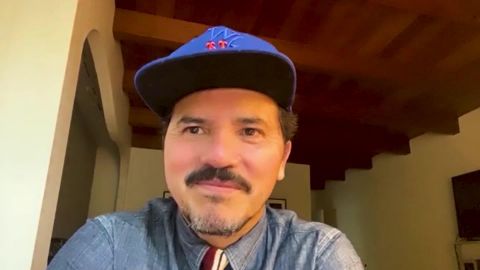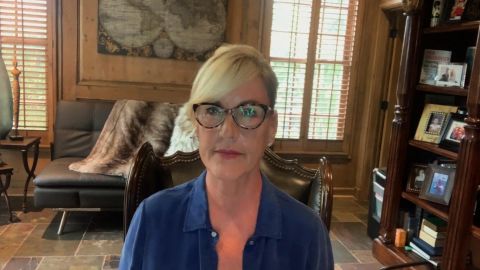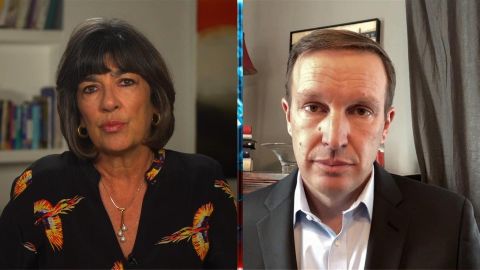Read Transcript EXPAND
CHRISTIANE AMANPOUR: Now, Latinx voters will also shape the outcome of the presidential election, with some 32 million eligible to vote this year. Stand-up comedian and actor John Leguizamo has starred on Broadway and dozens of films, including box office hits “Romeo and Juliet” and “Moulin Rouge!” He’s now a first time director with “Critical Thinking.” It’s the true story of a group of underprivileged Latinx and black teens who made it to the national chess championship back in 1998. And he tells Ana Cabrera, education and knowledge matter then and now.
(BEGIN VIDEOTAPE)
ANA CABRERA: Thanks, Christiane. And, John Leguizamo, welcome to the program.
JOHN LEGUIZAMO, ACTOR/DIRECTOR: Thank you for having me. What a blast. I have such huge respect for you and everything you do.
CABRERA: Right back at you. I’m excited to talk about your new movie, “Critical Thinking.”
(BEGIN VIDEO CLIP)
LEGUIZAMO: We got a tournament coming up in a couple days. So we need to start really considering if we’re serious about what we’re doing here or not.
(END VIDEO CLIP)
CABRERA: It’s your directorial debut, which is super exciting, obviously. What was it like for you being in that position?
LEGUIZAMO: Oh, my God, I had so much fun. I had such a great time. I didn’t realize that this whole catalog of directors’ techniques to solve problems. I mean, I worked with some of the best. I have been in over 100 films, not all of them good.
(LAUGHTER)
LEGUIZAMO: But I got to work with Spike Lee and Baz Luhrmann and Brian De Palma. And I have — Ava DuVernay. And I have all this information that I was able to use in the movie. And I felt like, oh, wow, I do have a visual sense. I have a great way of talking to actors. And I understand storytelling. And I think I was able to take this movie to the next level. So I’m excited to continue in this path.
CABRERA: And you also play one of the main characters, a high school teacher who is so passionate. You really pour your soul into these children who are underserved, overlooked, black and Latino students. And you help them on to the national chess championship. I have to ask, what, first of all — first of all, what drew you to this story? It’s a true story. Are you, like, a big chess player yourself?
(LAUGHTER)
LEGUIZAMO: I mean, I play a little chess. I knew a little bit. I used to go to Washington Square Park, where the best players would be, and I would lose all the time, but — and you play for money, and I’d lose all my money, but it was all right. I learned a little bit. But the thing that really drew me was, I knew what these kids went through. I knew what ghetto nerds feel, ghetto intellectuals. There’s no place for you. And this teacher, Mario Martinez, created this safe space for kids who didn’t want to go the wrong way, for kids that didn’t want to play football, for kids who liked using their mind, that were intellectual. He created this elective, this after-school elective where the kids could go and practice chess. And, obviously, it turned out to be a great idea, because they became United States chess national champs.
CABRERA: The movie is heartwarming and heartbreaking at the same time. When you say ghetto intellectuals, explain what you mean.
LEGUIZAMO: I mean kids who are cerebral, kids who are gifted, kids who are super bright, who love to read. And these kids in 1998, their school didn’t have enough supplies, didn’t have the electives they needed. And this one teacher, Mario Martinez, believed in them. And he’s — I met this guy. He’s an incredible nurturer. He just loves these kids and felt what he needed to give them, because they already had the talent and the brains and the passion. They needed the book knowledge to make — to cross them over from just being good chess players to become regional champs in every region in Miami, then state champs all over Florida, and then national champs. And one of the guys, Marcel, almost won international world champion. But they disqualified him for some weird off technicality that he wasn’t naturalized.
CABRERA: Wow. In the movie, you say chess is the great equalizer.
(BEGIN VIDEO CLIP)
LEGUIZAMO: All right, now, people, this is going to be very basic for some of you, but for the fish, or the newbies, as I like to call you, this is going to be eye-opening, because what you have got is 64 squares, 32 pieces. It doesn’t matter how rich or poor you are, what Ivy League school you may go, may not go to, what prison you hopefully never set foot in, because chess is the great equalizer, OK? Now, in the opening, white always most first. Now, I wonder what old white guy thought of that rule, right?
(LAUGHTER)
LEGUIZAMO: I know you hear me.
(END VIDEO CLIP)
CABRERA: I wonder, when you were doing research for this film, what did you learn? And what do you hope the audience learns as they watch?
LEGUIZAMO: Well, I — you do feel like chess is a great equalizer, because it doesn’t matter where you come from, or your ethnicity, or background, or how rich you or poor you are. It’s about the game and your ability. nd these kids proved it. And what I learned was, chess is a very intellectual sport. You have got to be five to 10 moves ahead. Like, in the movie, Marcel can play blind chess with up to five people. That means that he doesn’t have to look at the board. You just call out the name of the space you’re in, and the piece, he can do a move with five people at the same time without looking at the board. So, it’s all up here, that — the way they can see patterns in their heads.
CABRERA: You talked about how your own educational experience influenced how you went about this movie. And growing up myself in a Mexican American family, I can think about how important education is to my family. And my grandparents’ families immigrated from Mexico, and they really saw education as the biggest key to assimilation and financial stability, their ability to build a better future for us. And I’m just curious what your experience was like with education growing up.
LEGUIZAMO: Well, obviously, my parents believe education is the key to everything. It’s the most important thing. But you can believe that, but, if your schools are underfunded, and you have 45 kids to a class, it’s going to be impossible to learn. And that’s kind of the education I had. And the other problem is, Latin people have the highest high school dropout rate in America. And I believe it’s because these kids don’t see themselves in the history textbooks, in the literature, in anything. I mean, and then when you find out that we’re the ones who discovered this country and found it and then handed it over to the British, and then some of it was taken from us, and that we have been — and we were there before that as indigenous people. We were Aztecs, Mayans, Incans, Toltec, Zapotec, Apaches, Comanches. And 10,000 of us fought in the American Revolutionary War out of 80,000 troops. That means we were one in eight. And we had generals in the American Revolution. You had General Galvez, who had an army of 3,000 patriots who were Mexicans, Puerto Ricans, Cubans, freed slaves, and Native Americans. And they kicked the British out of the South, so the British couldn’t surround the patriots and crush them. So, if I had seen that in my history textbook, if kids could see themselves as these heroes, then you can project yourself as a success, and other people then would have to respect you. You can’t demonize Latin people, if you include our contributions to the making of America.
CABRERA: Why do you think it has been, in your words, written out?
LEGUIZAMO: If the hunter tells a tale, you’re not going to know the lion’s side. And I think it’s definitely sort of a power grab. Latin people, from 1830 to 1930, 1,000 were lynched and 5,000 were burned alive and shot, as they tried to take away their land, tried to take away their farms, tried to take away their ranches and their homes, and they — and then 1930, during the Repatriation Act, they deported 500,000 Latin people that were American citizens. They were American citizens, and they took away everything they had and threw them out. I mean, it’s crazy what they do to us. And if we’re in history textbooks and in literature and in classes and celebrated as heroes and makers of this country, then you can do — you can’t do that to us. But, without that, they can demonize us and say we’re not really American, when we really are, more than most.
CABRERA: When I look at these students portrayed in your movie, I mean, they are facing all kinds of barriers. There’s a language barrier. There’s poverty. There’s drugs and violence in their communities, in their homes. And, unfortunately, that is a sad reality for too many children in this country. You do take a potshot at public schools and funding in the movie.
(BEGIN VIDEO CLIP)
UNIDENTIFIED ACTOR: We’re here to raise $1,300 to offset our cheap public school system that’s a little broke.
UNIDENTIFIED ACTRESS: Oh, so you’re funding this yourselves?
UNIDENTIFIED ACTOR: Like I said, we were hoping our principal, Kestel, at Miami Jackson.
LEGUIZAMO: So much for a low profile.
UNIDENTIFIED ACTOR: We were hoping she was going to hook us up and get some school funding, but I don’t know. She probably needs, like, a fresh new pair of rims or something.
(END VIDEO CLIP)
LEGUIZAMO: That is not a potshot. I think I’m saying, this is one of the problems in public schools. I’m all for public schools. Public schools are very necessary and very important, but they’re not — I mean, Betsy DeVos defunded, defunded the public school system by $9 billion when she came in, and she’s trying to voucher now, so that you can create charter schools, so all the great kids in certain neighborhoods can go. And then what happens to the rest of them? Are they just forgotten, left behind? I mean, that’s not the key. The key is put more money. They just need money. That’s the magic serum, the magic–
(CROSSTALK)
CABRERA: So, you think that is the solution; it’s a financial problem above everything?
LEGUIZAMO: Absolutely. Absolutely. They have done lots of research. And they found out, in New York City schools as well, that all the better public schools, which are in white communities, get a lot more money than the public schools that are serving Latin and black kids.
CABRERA: Why is that?
LEGUIZAMO: Because white parents — when white parents complain, when they go to government officials and they write letters, they matter. When Latin and black people do it, they are just kind of ignored.
CABRERA: What has been your experience in Hollywood being a Latino?
LEGUIZAMO: Well, it’s been pos and neg, a little bit of both. I know, when I started out with all my white friends, we were all in the same acting classes at NYU. And they were going to five auditions a day, and I was going to one every five months, and always for something incredibly negative and demeaning. That’s why I started to write my own plays, because I was sick of having to play such a dark side of humanity just because I’m Latin? And that was not my experience of the people I saw. And Hollywood — you know, I pitched this movie. It’s impossible in Hollywood. I mean, we’re 20 percent of the population, if you include undocumented immigrants, and we’re 25 percent of the U.S. box office, but less than 4 percent of the faces in front of the camera.
CABRERA: Why?
LEGUIZAMO: Well, I think it’s because executives aren’t us. The gatekeepers aren’t Latin. We need executives who are Latin and see the value of our stories, who appreciate us, because where there are no gatekeepers, we win, like in music. J. Balvin is the number one star on Spotify. He beat Drake. And why? Because you can measure. We’re — Camila Cabello top 10. Maluma is top 10, Bad Bunny, Cardi B. Why? Because you can measure those scans. And, in baseball, we crush why? Because you can — you have stats. In politics, AOC crushed because what? Because you can count those votes. And we flipped four big seats in New York City to Latinas. Why? Because you can measure that. But when it’s a gatekeeper who we have to rely on his opinion or his taste, we lose, because he doesn’t see the value of our stories. They didn’t see the value of “Critical Thinking.” They would tell me: John, Latin people don’t want to see Latin people. I’m going, what?
CABRERA: Where are they getting that?
(LAUGHTER)
LEGUIZAMO: I was like, pull out your demographics, brother. Put out the — show me some stats.
CABRERA: Yes.
LEGUIZAMO: They were none. It’s just their wisdom. And Latin people don’t want to see–
CABRERA: So, it was an assumption.
LEGUIZAMO: Well, they pass it off. I mean, he’s an exec, so, I mean, you assume that it was research. But that can’t be research.
CABRERA: I know, for you, in your show, “Latin History For Morons,” it’s beyond entertainment. It’s about education.
(BEGIN VIDEO CLIP)
LEGUIZAMO: But, yo, what happened in the 3,000 years between our great indigenous civilizations and us? How did we become so (EXPLETIVE DELETED) damn nonexistent? Because, if you don’t see yourself represented outside of yourself, you just feel (EXPLETIVE DELETED) invisible.
(END VIDEO CLIP)
CABRERA: And you wanted to take this show on the road, but, because of coronavirus, everything’s been sort of turned upside down. But I know you’re trying to really get the Latino community engaged in their communities to prove to them they have that power, they have a voice, and they need to use it. So, what does this mean for your efforts?
LEGUIZAMO: Well, you’re right. Latin people, we’re the largest voting bloc in America, 32 million registered voters. We are going to decide this election. And what we need to do is just reach out to them. I mean, when you reach out like AOC, Alexandria Ocasio-Cortez, did, she knocked on doors, she stumped, she made calls. My mom stumped with her in Queens. And Latin people, when you talk to us, we respond. We’re loyal. But if you ignore us, we’re going to ignore you. So, that’s what my advice to everybody is. And then I’m doing what I can. I have talked to Beto O’Rourke. I have talked to Julian Castro, Veronica Escobar.
CABRERA: What about the current president and the vice president who’s running to defeat President Trump, Joe Biden? How — have you had any interaction, or what’s your take on how they’re courting Latin voters?
LEGUIZAMO: Yes, he’s been courting me through — and other Latinos — through all his surrogates. He’s definitely seeking the Latin voice and how to win our vote. And now what I have been telling his campaign is, name Latin people to your Cabinet. Put Julian Castro in your cabinet. Put Veronica Escobar in your Cabinet, AOC. Put us in your Cabinet and show us that you are including us, because we’re 32 million voters. That’s a huge bloc. We’re going to decide this. You need to talk to us directly by including us and talking about our issues. And that’s the only way we will see that it’s true.
CABRERA: And you’re right. According to Pew, Hispanic voters will make up or have the potential to make up the largest non-white voting bloc for the first time ever. In your mind, what’s on the line in this upcoming election for Latino Americans?
LEGUIZAMO: I mean, a lot is at stake. I mean, this is the most important election in our lives in so many ways. I mean, it’s a fight for our democracy against cronyism, against being ostracized. I mean, does Trump even have any Latin people in the Cabinet?
CABRERA: He doesn’t have a lot of diversity. You’re right about that. He doesn’t — he will point to Mercedes Schlapp as an example of–
LEGUIZAMO: Yes.
(CROSSTALK)
CABRERA: — one of the people who’s part of his administration.
LEGUIZAMO: I know. We’re 20 percent of the population. We should be 20 percent of his Cabinet. I’m not asking for more. I don’t want more. I just want parity. I just want equity. I want 20 percent of the roles in Hollywood. I want 20 percent of the children’s picture books to be about Latin kids, so they can see themselves. I want 20 percent of the Cabinet. That’s what I want. I want equity. I don’t want more. I don’t want to take anything from anybody. I just want what belongs to me and my people and people who look like me and children who look like me.
CABRERA: John Leguizamo, thank you.
LEGUIZAMO: Thank you. Much love.
About This Episode EXPAND
Sen. Chris Murphy (D-CT) discusses gun control. Belarusian opposition leader Svetlana Tikhanovskaya discusses her fight against authoritarianism. Environmental activist Erin Brockovich urges Americans to fight for universal access to clean water. Actor John Leguizamo joins Ana Cabrera to explain the inspiration for his latest film “Critical Thinking.
LEARN MORE



